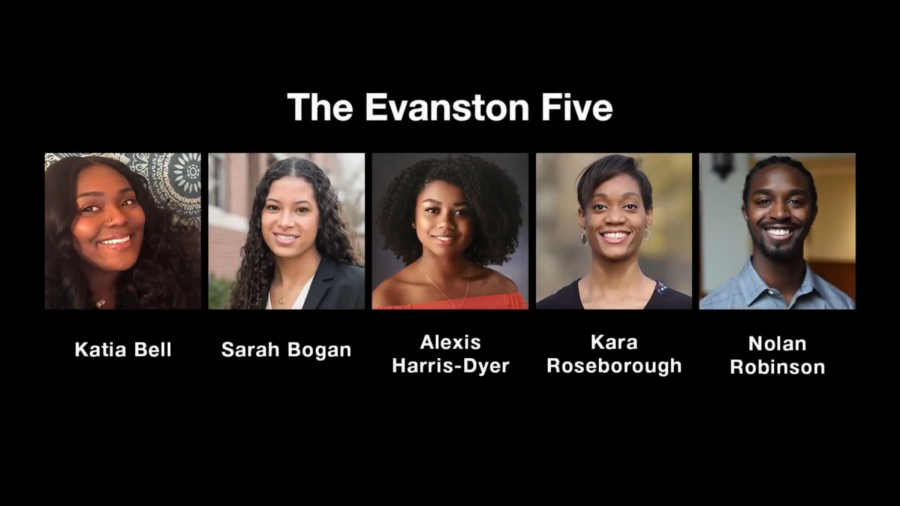Panelists discuss racism, significance of this year’s MLK Day
Laya Neelakandan/The Daily Northwestern
Five young Evanstonians discussed racism and MLK Day during a panel Monday night.
January 19, 2021
This year’s Martin Luther King Jr. Day, Evanston residents on a Monday panel agreed, was different from years past because of the frequency at which Black lives have been lost.
The panel, hosted by the Fleetwood-Jourdain Theatre, consisted of four young Black women from Evanston: Katia Bell, Sarah Bogan, Alexis Harris-Dyer and Kara Roseborough. The event was moderated by Evanston Township High School alum and Communication senior, Nolan Robinson Jr. Together, they are known as “The Evanston Five.”
Robinson began the event asking the panelists about Evanston’s diversity, the work that needs to still be done in addressing racism and how their perception of the racism in the city changed after returning home to Evanston.
“The rose-tinted glasses come off a little bit once you leave and come back, because growing up, it feels like we live in such a progressive city and the most forward-thinking city,” Roseborough said. “But we’re still really segregated.”
The panelists noted not all Evanston residents believe racism exists. Roseborough said some white residents don’t see a need to change a system from which they directly benefit.
Bogan provided another explanation for resistance to change, drawing from personal experiences in school learning about racism and the history of Black people in America.
“It’s an intentional lack of education,” Bogan said. “We don’t teach people accurate history… it was like a slap in my face (when I found out) I’ve just been taught lies.”
To remedy the lack of education, the panelists also discussed effective allyship and what White allies can do to support Black people. Roseborough said it’s not just about signing a petition or donating to an organization, but also about actively educating oneself and having honest conversations about one’s own racism.
“If you don’t know what’s going on, clearly you don’t care,” Bell said.
Robinson also touched on the movement to defund the Evanston Police Department and why it has been so controversial in the community. White people who resist defunding, Robinson said, are not directly impacted by police brutality in the way Black and brown residents are.
“There’s no such thing as a bad apple when the entire tree is rotten,” Bogan said. “When (Black people) say (defunding) is what we need, what we don’t need is White people turning around and telling us how to have a movement or how we should seek justice.”
Robinson also began a discussion on the upcoming mayoral elections. Both Bogan and Harris-Dyer agreed the mayoral candidates need to look at all issues through a racial justice lens and have people of all races and experiences in the room to help make decisions.
Reflecting on the significance of the holiday and the history behind it, the panelists also discussed how MLK’s activism has expanded.
“The biggest change is that what was one man is now women,” Bogan said. “Every movement that’s being led is being led by Black women.”
But, the path to a post-racial society will not be simple or fast, the panelists said. Harris-Dyer said she thinks it’s possible, but it won’t happen in her lifetime. Bogan agreed, adding that Black people should not bear the burden and responsibility of confronting racism.
The panelists emphasized the strength of beauty of Black people, especially Black women, in the journey toward building an antiracist and inclusive community in Evanston.
“This is our moment — we’re shifting the narrative,” Harris-Dyer said. “This MLK Day is so monumental because it’s our moment, our time, to lead as young people.”
Correction: A previous version of this story misstated the name of Nolan Robinson Jr.’s school. Robinson is a Communication senior. The Daily regrets the error.
Email: [email protected]
Twitter: @laya_neel
Related Stories:
— Panelists discuss racism and impact of coronavirus on marginalized communities
— Panelists discuss impact of 2020 presidential election on BIPOC communities


